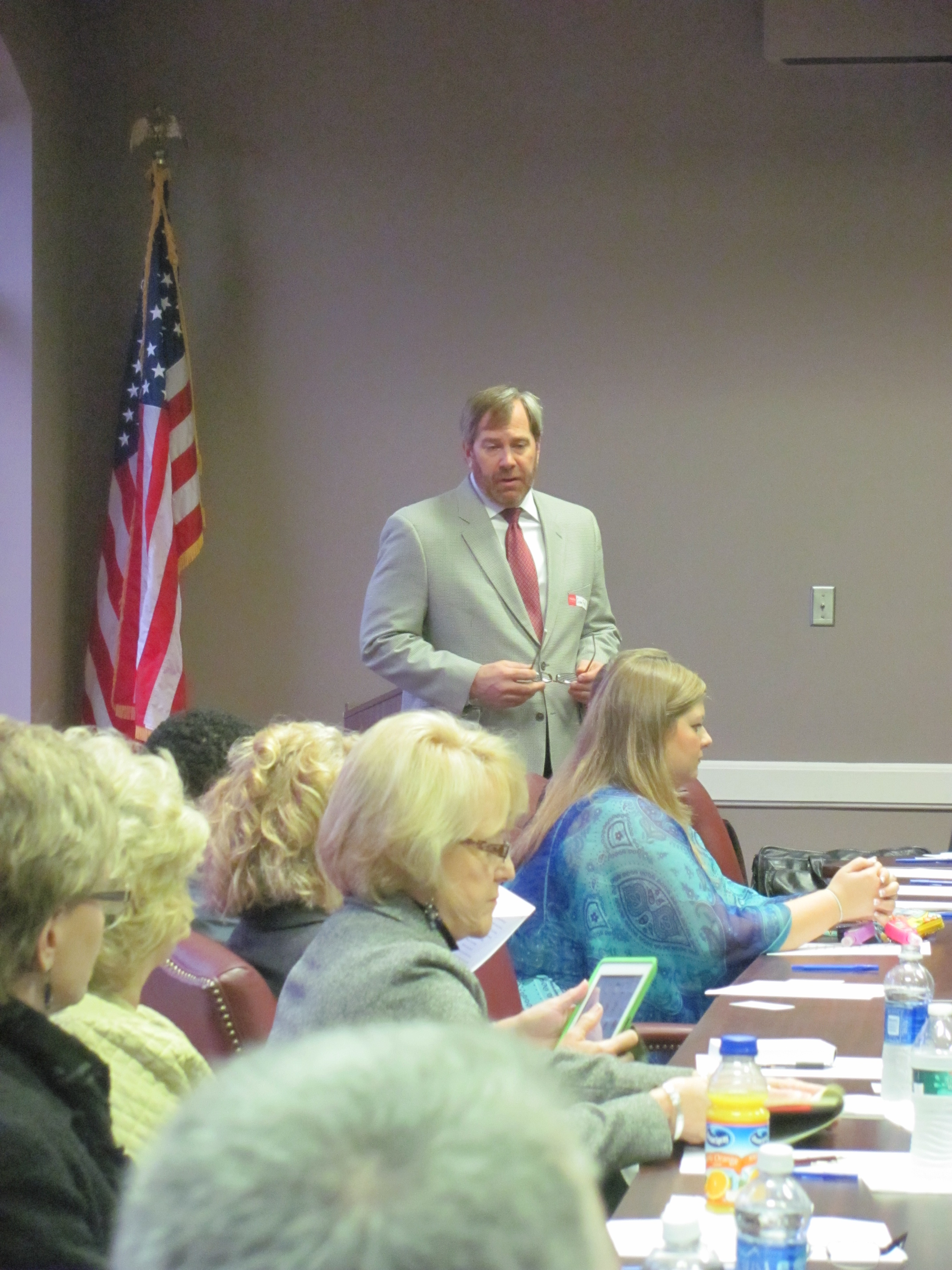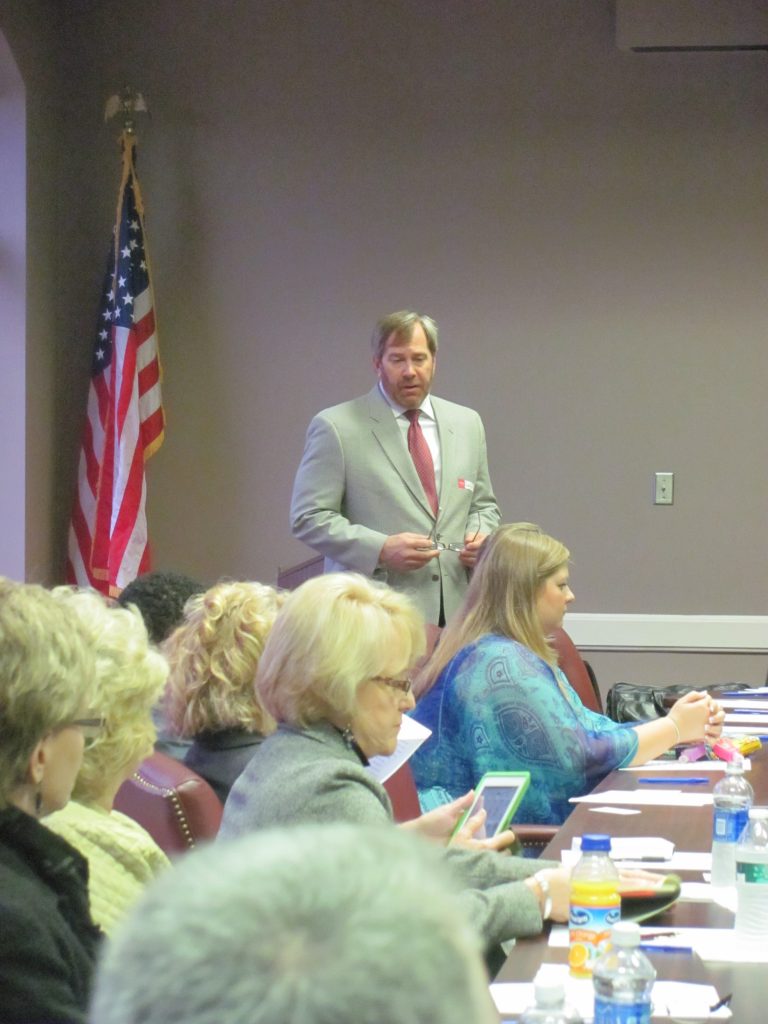By Donna Thornton/News Editor
The initial meeting of a committee appointed by Rep. Craig Ford to address the issue of school safety brought together people of varied experience, and not surprisingly, they brought a variety of ideas about how to address the issue.
Ford explained that he appointed this committee to work alongside the committee of Etowah County and school officials established by the Etowah County Commission.
“There is no political agenda in this committee,” Ford said. “We’re here for the safety and betterment of the schools.”
Ford explained that he wanted to bring non-elected officials into the discussion.
Ford introduced those appointed to lead the committee: Chairman Ralph Burke, director of Jacksonville State University’s Gadsden campus, Vice-Chairman Tony Reddick, director of J.K. Weaver Technical School, Secretary J. Holland and Treasurer Sharon Thomas. The committee’s other members come from a variety of backgrounds, ranging from current and former educators, law enforcement and military personnel to students in local schools. A number of the committee members, in addition to whatever other interest or expertise they brought to the committee, have children in the local school systems.
At the Jan. 14 meeting, many people offered their ideas of what was needed to protect students and faculty should something like the Sandy Hook Elementary attack occur.
“I think we’re going to have to get comfortable with the idea of firearms on campus,” J. Holland said. “I hate it. I wish it were the way it was when I grew up.”
“I don’t believe educators are prepared to be armed,” retired educator Kathyrn Barrett said. “Educators are trained to teach and provide school leadership not to protect children with firearms.”
A committee member who said his wife is a teacher said he thought it’s “insulting” to suggest she and other educators are not competent to be armed on campus.
Another in attendance, also the husband of an educator, said his wife is opposed to arming teachers.
Tim Lett, who said he has four children in Gadsden City schools, said it’s not a matter of what people like or don’t like. “No matter how many guns you take out of good hands, you’re not going to take them out of bad hands.” He mentioned the story of the Sandy Hook teacher who shielded her students with her body and was shot and killed during the Dec. 14 attack.
“I’d much rather she be prepared to send my child home rather than being the first to die,” Lett said.
“Let’s not get overwhelmed with emotion,” Tony Reddick suggested. He, like other members of the committee, spoke of the types of people involved in these incidents – that most seem to have a connection with the schools they attack, many as former or current students, and know who was at the school and how they would react. It was suggested that educators have a confidential way to report about people they feel concerned about.
“There’s a need to start addressing some of these people who are disgruntled,” he said. “When I was in school there were counselors you could go and talk to if you had a problem.” Now, Reddick said, counselors deal with so much testing and other tasks, they have much less time for counseling.
Heather New, who has three children in Gadsden schools, suggested there may be protective measure that teachers could be equipped with besides guns – such as Mace, which would not be deadly if it got into the wrong hands.
The discussion dealt with the number of SROs – school resource officers –in local schools and the cost of putting more officers there. The estimated cost is $50,000 per SRO. Some present said they would be willing to pay additional taxes to make schools safer.
However, others questioned how much safer that would make schools, without addressing the kind of problems that have led to many of the school shootings.
“Every SRO we put in schools is a waste of money if we don’t put a mental health professional there,” Etowah County District Attorney Jimmie Harp said. He said there’s no question more SROs are needed, but that discussions of these issues need to include mental health professionals, too. The key question, he said, is how these would be funded.
Like Barrett, some of the other former and current educators did not support arming teachers or other school personnel.
Others suggested that retired military or law enforcement personnel probably would be willing to provide security as schools.
To do that, Etowah County Sheriff Todd Entrekin said, a change in federal law would be needed. After the 1999 attacks at Columbine High School in Colorado, federal laws were put in place banning anyone but certified officers from having a firearm on a school campus. To put volunteers into the schools, Entrekin said, they’d have to have much the same training as SROs.
Some students were involved in the meeting and offered ideas.
Rebecca Christianson, a student at Gadsden City High School, said she remembered when she was in elementary school, there were frequent lock-down drills. “We don’t have them as much anymore,” she said. If schools had more drills, Christianson said, some high school students might be dismissive, but they still could learn how to react in an emergency.
Harp said just after the Columbine attacks, a lot of money was poured into putting SROs in schools. When things were quiet for a while, he said, that money was taken back.
Etowah High School student Michael Smith talked about the realities of modern-day schools.
“I see kids making fun of and laughing at people,” Smith said. He said it had happened to him, but he was able to shrug it off. “I’m sure there are people who are bottling it up and bottling it up and one day it’s going to blow,” he said.
“Growing up today is hell,” Harp said. The “knee-jerk” reaction to an incident like the Sandy Hook attack is “more firepower,” he said, “and enforcement is important.”
Some of the same volunteers who might be used as armed security at schools, could serve well as mentors to students.
Harp said there are many things that people can do to help as schools “besides showing up with a gun.”
The meeting ended with the assurance that no suggestions were “off the table,” at this point. The committee will meet again Feb. 1, and will schedule meetings with the upcoming legislative session in mind, should the committee have recommendations to make to lawmakers.





